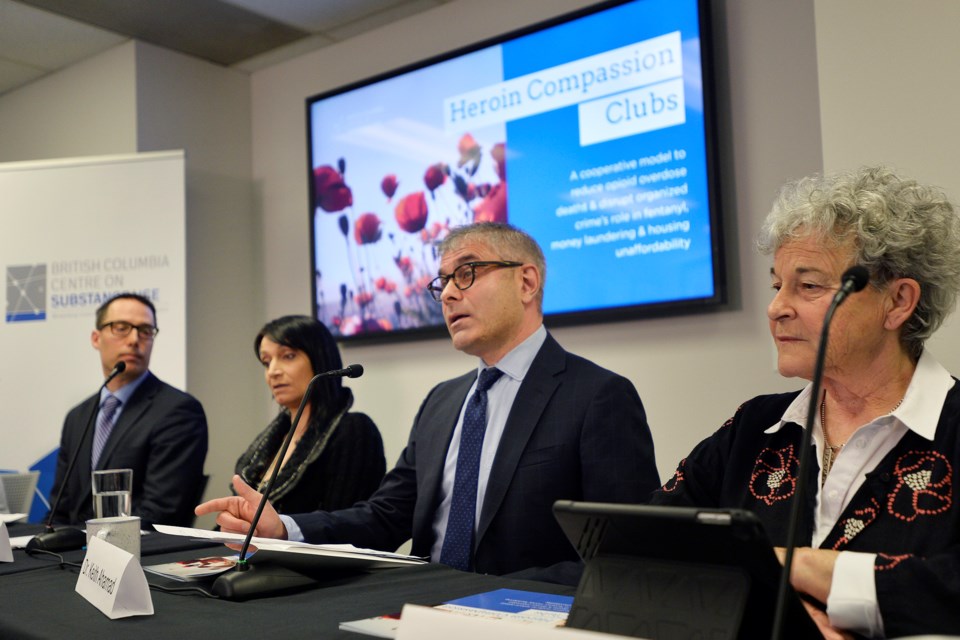A B.C. organization whose mandate is to develop and help implement new approaches to substance use and addiction has recommended “heroin compassion clubs” be set up in Vancouver and across the province to reduce the mounting number of overdose deaths.
Dr. Evan Wood, executive director of the BC Centre on Substance Use, said Thursday that such a model would allow a heroin user to join what would most likely be a non-profit organization to buy medical grade heroin instead of relying on fentanyl-laced heroin from the streets.
“I’m going to share with you what elected officials will often acknowledge privately, but are hesitant to acknowledge in public—and that’s that the fentanyl epidemic is a natural consequence of heroin prohibition,” said Wood at a news conference, where the Centre released its report on the call for heroin compassion clubs.
In his opening remarks, Wood tied the fentanyl crisis to a spike in organized crime, money laundering and housing unaffordability, which was a first in Vancouver for a harm reduction organization advocating in a report for new approaches to drug addiction.
“As you’ve seen, recent investigations [by police, government and journalists] have concluded that about $5 billion per year is being laundered in the Lower Mainland real estate market,” he said. “And I can say with a lot of confidence, that is just the tip of the iceberg.”
Setting up heroin compassion clubs would allow governments to control and regulate the use of heroin, while at the same time “waging economic war” on organized crime, said Wood, who emphasized such a club would only provide membership to severely addicted drug users assessed by health care professionals.
“If you’re coming into town to see a Canucks game, and you heard you could buy heroin and you’re not a heroin user, you’re not going to be able to buy heroin [at a compassion club],” he said, acknowledging the proposal would first need federal government approval.
A compassion club member would be allowed to purchase a personal amount of heroin at a site that Wood envisions would include an injection room, along with addiction treatment services and programs to train users on how to use the overdose-reversing naloxone.
The heroin, or diacetylmorphine, would be obtained through a pharmaceutical supplier through federal government legal means and handled in a safe and secure manner similar to how pharmacies operate. The report makes comparisons to compassion clubs that supply cannabis to members.
Cost to buy medical grade heroin for the user hasn’t been finalized but the goal is to make it cheaper than what’s available on the street. One-tenth of a gram of heroin sells for approximately $20 on the street.
The idea, which was inspired by harm reduction activists Dean Wilson, Erica Thomson and Ann Livingston, is in response to the unprecedented number of overdose deaths in B.C, the majority of which linked to the deadly synthetic narcotic, fentanyl.
Overdoses have wiped out almost 3,000 people in B.C. in the past three years—993 in 2016, 1,487 in 2017 and 1,489 last year, with those numbers expected to increase once the BC Coroners Service concludes investigations. In contrast, 183 people in B.C. died of an overdose in 2008.

The increase in deaths has come despite efforts by governments, health care experts, harm reduction workers, police and others combatting an overdose crisis that shows no signs of abating. Governments have spent hundreds of millions of dollars in attempts to reduce the death toll.
Some non-profits such as the PHS Community Services Society have operated programs that supply users with alternatives to street drugs, including prescription heroin made available to about 160 clients of the Crosstown Clinic in the Downtown Eastside.
Injectable hydromorphone programs also exist, as do long-running methadone programs and Suboxone treatment.
Dr. Christy Sutherland, medical director of the PHS Community Services Society, and Dr. Keith Ahamad, medical director of the regional addiction program for Vancouver Coastal Health, said at the news conference that heroin compassion clubs would complement existing treatment programs and primary care services.
“To be clear, we are not going to let up on creating a comprehensive addiction treatment system,” Ahamad said. “But this model for providing legally regulated heroin to stop overdose deaths now is desperately needed.”
Sutherland described the last few years as “running up hill,” noting many physicians in B.C. have worked hard to scale up approaches to keeping people from dying of drug overdoses. But every month, she said, new overdose statistics are released.
“And each time that number comes out, you feel heartbreak, you feel you aren’t working hard enough, and you feel grief—that you’ve lost people that you care about,” she said. “It’s my job to care about my patients and my job to care about British Columbians and my community where I work.”
Wilson, a longtime harm reduction activist, reminded reporters there was a lot of pushback against opening a drug injection site in Vancouver. But when Insite opened in 2003, Wilson said “the world didn’t end.”
He drew parallels to the fight to open Insite to the fight to open heroin compassion clubs.
“It may seem incredibly controversial right now, but it makes sense,” said Wilson, noting he’s been addicted to heroin for 50 years. “I’ve lasted, I’ve made it through. But what’s killing me is that all my friends are dying.”
Mayor Kennedy Stewart said in a separate interview Thursday that he welcomed “outside of the box thinking” by what he described as some of the best doctors in the world.
“For me, I’m open to these ideas and want to explore them more fully,” said Stewart, who campaigned for mayor on considering all drug policy options, “including initiating a safe and accessible supply of drugs for those at high risk in the current illegal and dangerous market.”
Police Chief Adam Palmer said Thursday he hadn’t read the Centre’s report.
“What I would say is that I think anybody trying to do something different and trying to be innovative is a good thing, but the devil’s in the details, so I really need to go through the report,” Palmer said
Opening a heroin compassion club would require the approval of the federal government. The Courier sought comment from Health Canada and federal Minister of Health Ginette Petitpas Taylor, but had not received a response before this story was posted.
The Centre’s proposal comes as the country’s federal political parties are mobilizing for this fall’s election. The Conservative Government of Stephen Harper opposed harm reduction during its years in power, fighting via the courts to close Insite.
Wood noted the idea for heroin compassion clubs has the support of Prof. Werner Antwiler of the University of B.C. Sauder School of Business and Prof. Robert Gordon of the criminology department at Simon Fraser University.
B.C.’s Chief Coroner Lisa Lapointe said the effort is “worth applauding.”
“For elected officials,” Wood said of the compassion club plan, “oppose this at your peril.”
Note: Health Canada emailed this statement to the Courier Friday afternoon.
“Health Canada is committed to a compassionate and evidence-based approach to drug policy, which recognizes that problematic substance use must be treated as a health condition first and foremost.
In the fall at the Opioid Symposium, the Minister of Health asked that officials explore options to address the toxic drug supply. Health Canada is committed to exploring additional options to help support the recovery of people with problematic substance use.
Medication-assisted treatments are an additional tool for reducing harms, providing pathways for recovery and improving health outcomes. Given the scope of issues associated with establishing medication-assisted treatments as an alternative to toxic street drugs, as well as the number of stakeholders involved, this work is ongoing.
The report from the BC Centre for Substance Use will be considered as part of this work.
We remain committed to working with the provinces and territories as well as other partners and stakeholders to increase access to a range of evidence-based treatment services through the Emergency Treatment Fund (ETF), including medication-assisted approaches as a substitute to toxic street drugs; to raise awareness about the stigma faced by people who use drugs; and to support effective harm reduction measures.”
@Howellings



